As a digital marketer, you must develop and adhere to the best practices for generating content that is more likely to rank highly in Google search results. Therefore, every digital marketer’s toolkit should include search engine optimization (SEO). Here are the benefits of SEO and why your business, whether big or small, needs it.
Optimizing content can be time-consuming without the best content writing tools for SEO. There are numerous SEO tools for content creation. However, not every tool for writing SEO content will enable you to achieve your objective of producing valuable and well-optimized material.
Therefore we have created a list of the best content creation tools for SEO to help you at the various phases of content development. They all can improve your business by saving you time and effort and increasing reader engagement.
What is Content Writing?
Content writing is the process of creating written content for marketing reasons. This typically refers to articles and blog postings. However, writing content can also refer to creating other kinds of content, such as scripts for videos and podcasts, ebooks, white papers, and even tangible items like flyers and brochures.
What is SEO Content Writing?
SEO writing involves optimizing your online content using keywords and search terms people use to get information online. Here is a guide to writing amazing SEO-friendly content.
Making sure the keyword or related keywords are present in subheadings, title tags, and meta descriptions is part of SEO writing. Additionally, it entails covering the issue in-depth and addressing search intent.
Digital marketers work to rank their websites at the top of search engine results pages (SERPs) for terms that their target consumers are using to find webpages. You can use content writing tools to help with keyword research, content organization, headings, and title, among other things, to get the best results from search engines.
The Best Content Writing Tools For SEO
1. Surfer SEO

Image Credits: startupbonsai.com
Surfer SEO can help you raise your SEO rankings and boost the likelihood that your post will reach more people since it is a content optimization tool. It performs a reverse engineering analysis of the content that currently ranks on the first few pages for a specific keyword.
Surfer offers many related search terms and divides them into useful categories based on a single phrase, allowing you to target several search terms in a single piece of content. It also sheds light on search volume and intent.
This web app also has a content editor tool that rates writers’ work as they create it and keeps track of the frequency with which relevant search terms have been used. It also has an audit tool that alters and improves already-existing content on your website.
Surfer tops the list of the best content writing tools for SEO, perfect for website owners who contract out writing work. This is because it allows you to build thorough briefs for authors and uphold constant quality standards owing to the content score system.
Surfer is compatible with different platforms. For instance, the Chrome add-on enables content optimization within Google Docs and WordPress.
Pricing:
The monthly subscription starts at $49.
Pros:
- Pleasant user interface.
- It includes an auditing tool.
- Compatible with different platforms.
- It includes features for content planning and optimization in one place.
Cons:
- No free trial is offered.
2. Frase

Image Credits: startupbonsai.com
Frase aids in content creation and editing for search engine optimization. In addition, it has a wealth of intriguing content optimization and conversion capabilities. Frase is a good content writing tool because it can compose your material, perform keyword research, and ensure it is optimized for search engines.
It’s a terrific option for newcomers and solopreneurs because of how quick and easy it is to use, thanks to AI-powered technology. When you enter your target term, machine learning works its magic and suggests additional keywords for you to use. It also gives you ideas as to subheaders and sections you should include.
Frase also offers several writing tools that might expedite the writing process. For example, the Write For Me function can help you finish your sentences and create new material bodies.
The automatic paraphrasing and rewriting tool is another tool you can utilize to raise the caliber of your writing. Finally, Frase is a fantastic all-in-one content writing tool because it offers many functions that may help you optimize and evaluate your material.
Pricing:
The monthly subscription starts at $44.99.
Pros:
- Each tool is simple to use.
- AI writing tools make it simple to create content.
- It streamlines the process of creating and preparing content.
- Google Search Console data is transformed into useful insights by powerful analytics.
Cons:
- The cheapest plan only accommodates one user.
- No free trial is offered.
3. Grammarly Premium
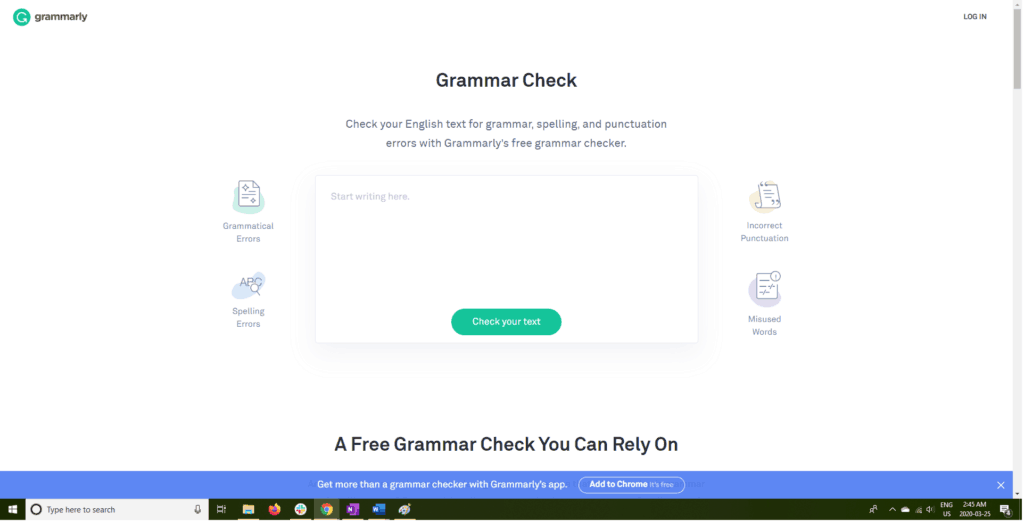
Image Credits: directiveconsulting.com
Grammarly makes it simple to write both spelling and grammar-correct content because Google evaluates the language and spelling on your website. A website’s likelihood of ranking highly on search engines is lower if its content contains numerous spelling errors.
Grammarly also recommends more complex grammar modifications that you can make to better and optimize your work as a whole. It even picks the tone of your text and provides suggestions and modifications where necessary.
It can assist you in correcting your writing errors anywhere on the internet because it’s a Chrome plug-in. Therefore, you can add the tool to your browser and use it when writing emails, social media updates, or blog posts. Grammarly also has a plagiarism detector tool that makes it perfect for editing your content before publishing.
Pricing:
The free version has basic functions, and a subscription to Grammarly Premium costs just $12 per month.
Pros:
- There is a free option.
- Premium features include things like tone and plagiarism detection.
- Simple-to-use browser add-on.
- Affordable paid plan.
Cons:
You are limited to editing.
4. SEMRush SEO Writing Assistant

Image Credits: directiveconsulting.com
SEMRush SEO Writing Assistant is an effective writing tool that helps you optimize your on-page SEO for keywords and readability. You may use it wherever you like to write because it connects with MS Word 365, Google Docs, and WordPress.
It is a component of the SEMrush platform, the most comprehensive SEO and content marketing toolkit available, with 40 tools included in the monthly subscription package. It is a tool you can use for keyword research, SERP Tracking, evaluating backlinks, and monitoring the performance and traffic of your websites or those of your rivals.
SEMRush can fuel the majority of any content & SEO strategy. It also helps you find new markets, niches, and opportunities. In addition, it includes a site audit tool that can assist with some technical facets of website SEO.
Pricing:
Some services are free, but monthly paid subscriptions begin at $119.95.
Pros:
- It serves as a plagiarism detector.
- Effective tool for optimizing content.
- It integrates with well-known writing editors.
- A complete set of SEO and content marketing capabilities are available in the paid edition.
Cons:
- Only one content template is allowed for free accounts.
5. Jasper.AI

Image Credits: startupbonsai.com
The AI, content writing tool Jasper.ai, was formerly known as Jarvis.ai. It makes it incredibly easy to write material for blogs, and social media, automating the creation of product descriptions and more.
Its strong integration with Surfer SEO enables you to focus on a term and productively construct the article with SEO in mind.
Jasper is made to undertake the writing work; all you need to do is provide it with some information about what you want it to write. However, since it doesn’t always produce content that fits your site, the content still needs to be edited, checked, and overseen by a human.
Pricing:
The monthly subscription starts at $29.
Pros:
- Simple to use.
- Great for accelerating content creation.
Cons:
- Sometimes the final content needs to be overseen by a human.
6. BuzzSumo
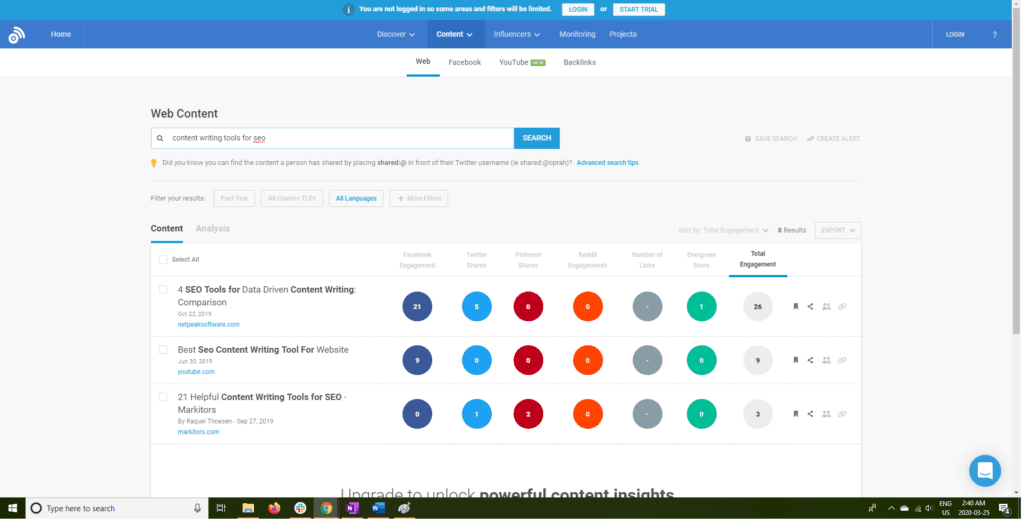
Image Credits: directiveconsulting.com
BuzzSumo is a platform for content marketing that is ideal for aiding in keyword research and helping you evaluate your content strategy. You can develop original and captivating content ideas and get in-depth SEO insights with the help of the BuzzSumo content discovery tool.
You can use the content research tool to scan and evaluate articles and social media postings relevant to your area to create a comprehensive and informative content strategy. BuzzSumo can also assist you in finding influential people that are related to your industry, monitoring mentions, and much more.
Pricing:
A limited free version is available. Paid subscriptions begin at $79 per month.
Pros:
- Cutting-edge content research.
- Additional content marketing features, some of which aren’t available in other tools.
Cons:
- Only 10 searches are allowed each month under the free plan.
7. Hemingway
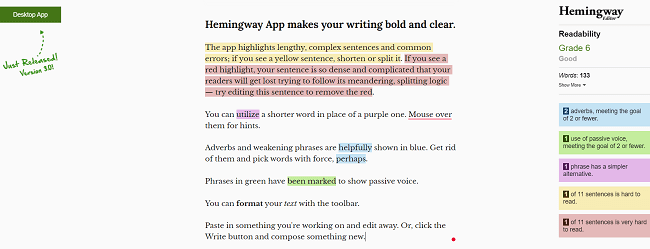
Image Credits: startupbonsai.com
Search engines reward well-written material, and programs like Hemingway Editor can help you with your writing. It is one of the top free content writing tools available. A better user experience is ensured by creating well-written and simple-to-read material, thanks to the Hemingway editor.
By evaluating the text you submit, Hemingway checks for writing errors, including passive voice, weak words, and run-on sentences. Your work is graded on the sidebar, and the editor highlights and color-codes weak sentences so you know what needs to be addressed.
Pricing:
It costs nothing to use the Hemingway Editor online. However, a desktop app costs $19.99.
Pros:
- Robust readability checker.
- User-friendly editor interface.
- Suggestions with color codes.
- Accessible desktop application.
Cons:
- It does not interact with Google Docs or WordPress.
8. Clearscope

Image Credits: startupbonsai.com
Clearscope is one of the most effective content optimization tools available. It looks up the first few pages of Google for a particular term to determine which words appear and which are the most significant in terms of ranking.
It uses artificial intelligence or machine learning to provide you with suggestions and a desirable optimization score. In addition, the keyword discovery tool aids in choosing search terms to target in your content strategy.
Clearscope reports let you audit and evaluate the data from top-ranking Google search results. It can be connected to WordPress or Google Docs using plug-ins or add-ons. Clearscope should unquestionably be in your arsenal if you can afford it.
Pricing:
The price starts at $170 per month.
Pros:
- Quickly creates content summaries.
- Real-time text editor.
- Simple to use.
- Effective
Cons:
- It is quite pricey.
9. Yoast SEO
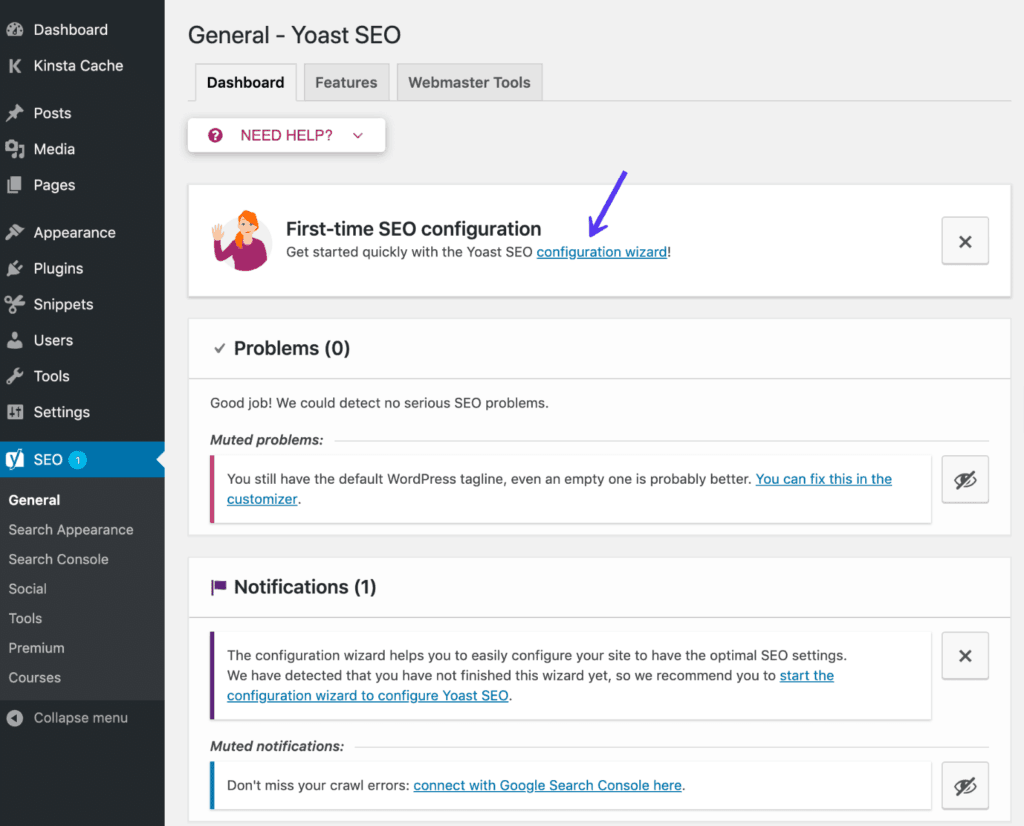
Image Credits: directiveconsulting.com
Yoast SEO is a WordPress plug-in that offers real-time feedback as you work to make your blog posts better. For each blog post you produce, the plug-in functions as a built-in checklist tool, prompting you to do the on-page SEO duties.
Additionally, it provides technical SEO features like 301 redirects, schema, meta descriptions, and more. It is an all-in-one SEO tool integrated within your WordPress site, where you write and publish.
Pricing:
Yoast SEO is free in its most basic form. Yoast SEO Premium has a monthly starting price of $22 for a license for a single website, but you may save money by getting numerous licenses for several sites at once.
Pros:
- User-friendly.
- SEO proofreader.
- It provides the appropriate keyword.
Cons:
- It sometimes can’t comprehend the intention.
10. Google Keyword Planner
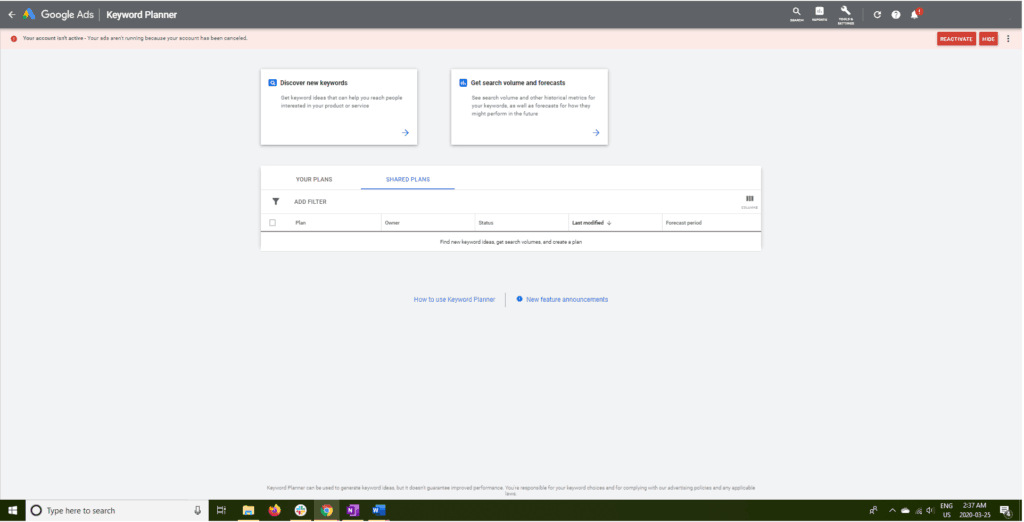
Image Credits: directiveconsulting.com
Most digital marketers either utilize the Google Keyword Planner or a more expensive version with more functionality for keyword research. It is one of the best free content writing tools for performing fundamental keyword targeting research. Perfect for newbies in the content writing space. Anyone with a Google Ads account can use it for free.
This keyword planner helps you:
1. Find new or related keywords
By typing in a term, you can view a list of related keywords and information about their search volume and other relevant metrics.
2. Get search volume and forecasts
You may keep an eye on trends to spot keywords or search terms that are rising in popularity.
Pricing:
It is free for anyone with a Google Ads account.
Pros:
- Easy to use.
- It is incredibly accurate.
- Anyone with a Google Ads account can access it free (which is also free to create).
Cons:
- It has a small number of features and is fairly basic.
11. Google Search Console
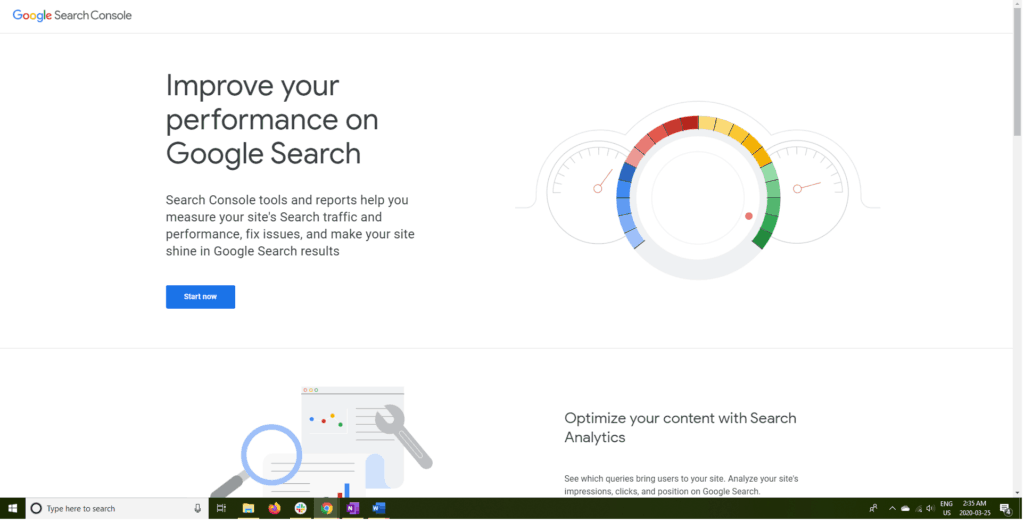
Image Credits: directiveconsulting.com
The Google Search Console is a service created by Google that can help you raise your position in search engine results. In addition, the console has options for measuring your website’s performance, including page load times that affect SEO.
You can keep track of where your website stands in the Google search results and which of your pages display particular keywords. You can also check how many impressions and clicks your pages have received in the search engine results pages.
Google Search Console offers much-needed transparency into the performance of your pages. For example, it can help you decide which keywords to focus on next or whether the content needs to be adjusted.
Pricing:
Free
Pros:
- It helps gauge the performance of the pages.
- It keeps track of your website.
- It is free.
Cons:
- It is fairly basic.
12. Answer the Public

Image Credits: directiveconsulting.com
You may enter any keyword into this free online tool to receive a comprehensive depiction of queries others have searched for with that keyword. In addition, snippets, one of the most significant recent improvements to the Google search results pages, are connected to Answer the Public.
A snippet is a tab at the top of the page that draws attention to a frequently asked question associated with the target term. Google then connects users to a web page that provides an explicit response to that query when they click on the snippet. Being included in a Snippet is a fantastic way to increase organic traffic.
With Answer the Public, you can create incredibly targeted content that answers queries you are aware are being entered into search engines. This increases the likelihood that Google Snippets will include your articles.
Pricing:
Three daily searches are free; however, limitless searches are available starting at $99 per month.
Pros:
- It has a free version.
- It includes snippets that increase organic traffic.
- It is easy to find topics to write on a specific keyword.
Cons:
- You only have 3 searches per day in the free version.
13. Keyword Density Checker
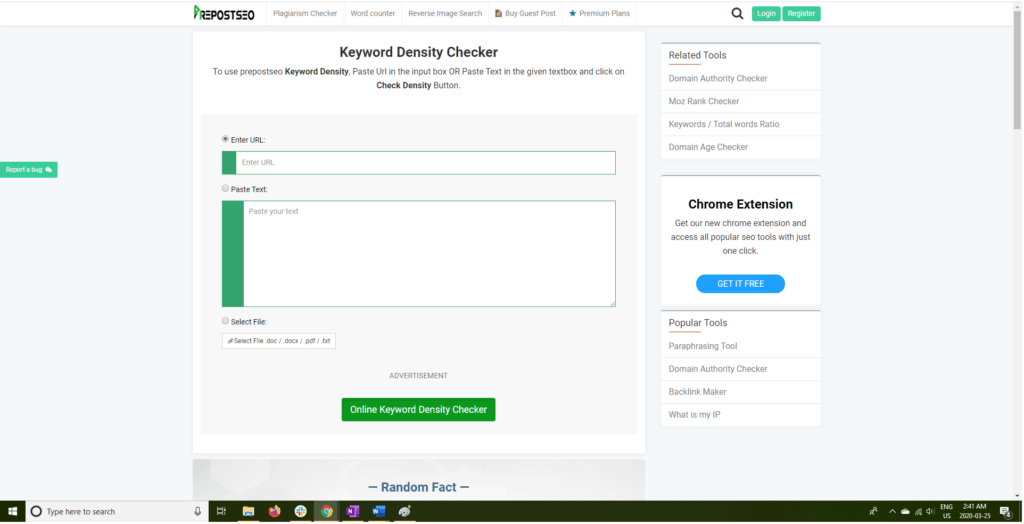
Image Credits: directiveconsulting.com
When ranking web pages, search engines like Google consider keyword density. Therefore, you need to remember this while determining the relevancy of each piece of content. This is where the Keyword Density Checker comes into play.
It is crucial to ensure the target keyword is referenced inside the content a sufficient number of times for each blog post. However, using the keyword too frequently, sometimes referred to as “keyword stuffing,” is discouraged.
The keyword density checker helps you determine how frequently each term is used in your post. You can put the text of your article into the box to the right to get a list of the most common one-word, two-word, and three-word keywords therein. It would be best to strive for a keyword density of 2 to 5 percent for the target term in most content items.
Pricing:
The PrePostSEO team offers over 75 free SEO tools, including a keyword density checker. Five hundred queries can be made by website visitors monthly using all available technologies. In addition, users can purchase a premium subscription to enable more searches for $50/year for 50,000 annual searches.
Pros:
- It has several tools.
- It helps prevent keyword stuffing.
- It is free and hence suitable for newbies with a limited budget.
Cons:
- The free version is limited to 500 queries.
Frequently Asked Questions(FAQs)
1. Why Should You Utilize Tools for Writing SEO content?
- They assist you in making your content more keyword-optimized.
- They ensure your SEO material is the proper length for your chosen subject.
- With the use of SEO content tools, your material is improved to compete with high-ranking content.
- Utilizing content tools will ensure that your writing is grammatically sound and error-free.
- They assist you in creating content at the appropriate reading level for your target audience.
- SEO content tools provide relevant keywords and contextual cues to assist you in shaping your content for the right search intent behind the search query.
- You are encouraged to incorporate photographs and other media by SEO content tools to enhance your content.
2. What are the Best Content Writing Tools for SEO?
As you can see, many tools are available for writers, strategists, and marketers to use when creating content for SEO, but you don’t have time to try them all. In light of this, the following three are ones we would unquestionably suggest starting with:
Surfer SEO
The greatest option for content optimization is Surfer SEO. It provides precise instructions on what related keywords to add and how to arrange your content for SEO, making it a fantastic resource for writers and marketers. Additionally, it grades your content and informs you of what should be done to improve it.
Frase
The finest program for creating content briefs is called Frase. It uses the data to build SEO-optimized briefs for you in a matter of seconds after analyzing the top-ranking pages for every target keyword, saving you work hours.
Grammarly
Every content writer needs Grammarly as a tool. It is the most effective spelling, grammar, and plagiarism-checking tool. In addition, it assists you in ensuring that your written work is free of obvious mistakes and concerns with readability.
3. What Distinguishes Content Writing From Copywriting?
Producing material for marketing objectives is a task shared by copywriting and content writing. The primary distinction between them is that content writing is specifically for content marketing or SEO aims, for instance, improving brand awareness, building customer trust or driving traffic.
On the other hand, copywriting is specifically for advertising purposes. Such as motivating readers to take action or generating sales. Another difference is that content writing primarily seeks to inform or educate, whereas copywriting seeks to persuade.
Email copy, landing page copy, and short-form advertising copy are a few examples of copywriting. Long-form informational blog entries, how-to articles, and FAQ guides are a few content writing examples. Should a small business invest in SEO? Here is a list of affordable SEO services for small businesses.
Conclusion
Our best content writing tools for SEO cover every phase of content development, from keyword research to grammar and spelling checks. We hope that some of these resources will help you write content for organic search more quickly and efficiently. Feel free to reach out to us, Indexsy, to help you scale your content if you need more assistance.
Featured Image Credits: keysandcopy.com
Jacky Chou is an electrical engineer turned marketer. He is the founder of Indexsy, Far & Away, Laurel & Wolf, a couple FBA businesses , and about 40 affiliate sites. He is a proud native of Vancouver, BC, who has been featured on Entrepreneur.com, Forbes, Oberlo and GoDaddy.





